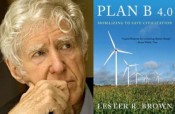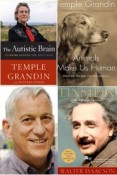DISRUPTIVE: BIO-INSPIRED ROBOTICS features three separate interviews with (1) RADHIKA NAGPAL, (2) ROBERT WOOD, and (3) CONOR WALSH
Written on October 15th, 2015Welcome to the second episode of my new monthly podcast series produced with Harvard’s Wyss Institute for Biologically Inspired Engineering.
DISRUPTIVE: BIO-INSPIRED ROBOTICS features three separate interviews with (1) RADHIKA NAGPAL, (2) ROBERT WOOD, and (3) CONOR WALSH. From insects in your backyard, to creatures in the sea, to what you see in the mirror, engineers and scientists at Wyss are drawing inspiration to design a whole new class of smart robotic devices
In this one, CONOR WALSH discusses how a wearable robotic exosuit or soft robotic glove can assist people with mobility impairments, as well as how the goal to create real-world applications drives his research approach.
In part one, RADHIKA NAGPAL talks about her work Inspired by social insects and multicellular systems, including the TERMES robots for collective construction of 3D structures, and the KILOBOT thousand-robot swarm. She also speaks candidly about the challenges faced by women in the engineering and computer science fields.
In part two, ROBERT WOOD discusses new manufacturing techniques that are enabling popup and soft robots. His team’s ROBO-BEE is the first insect-sized winged robot to demonstrate controlled flight.
The mission of the Wyss Institute is to: Transform healthcare, industry, and the environment by emulating the way nature builds, with a focus on technology development and its translation into products and therapies that will have an impact on the world in which we live. Their work is disruptive not only in terms of science but also in how they stretch the usual boundaries of academia.
http://wyss.harvard.edu/
– See more at:
DISRUPTIVE: BIO-INSPIRED ROBOTICS Radhika Nagpal Interview
DISRUPTIVE: BIO-INSPIRED ROBOTICS Robert Wood Interview
Conor Walsh’s interview transcript
http://aworldthatjustmightwork.com/2015/07/auto-draft-18/
DISRUPTIVE: BIO-INSPIRED ROBOTICS features three separate interviews with (1) RADHIKA NAGPAL, (2) ROBERT WOOD, and (3) CONOR WALSH
Written on October 7th, 2015
Welcome to the second episode of my new monthly podcast series produced with Harvard’s Wyss Institute for Biologically Inspired Engineering.
DISRUPTIVE: BIO-INSPIRED ROBOTICS features three separate interviews with (1) RADHIKA NAGPAL, (2) ROBERT WOOD, and (3) CONOR WALSH. From insects in your backyard, to creatures in the sea, to what you see in the mirror, engineers and scientists at Wyss are drawing inspiration to design a whole new class of smart robotic devices
In this one, ROBERT WOOD discusses new manufacturing techniques that are enabling popup and soft robots. His team’s ROBO-BEE is the first insect-sized winged robot to demonstrate controlled flight.
In part one, RADHIKA NAGPAL talks about her work Inspired by social insects and multicellular systems, including the TERMES robots for collective construction of 3D structures, and the KILOBOT thousand-robot swarm. She also speaks candidly about the challenges faced by women in the engineering and computer science fields.
In part three, CONOR WALSH discusses how a wearable robotic exosuit or soft robotic glove could assist people with mobility impairments, as well as how the goal to create real-world applications drives his research approach.
The mission of the Wyss Institute is to: Transform healthcare, industry, and the environment by emulating the way nature builds, with a focus on technology development and its translation into products and therapies that will have an impact on the world in which we live. Their work is disruptive not only in terms of science but also in how they stretch the usual boundaries of academia.
http://wyss.harvard.edu/
– See more at:
DISRUPTIVE: BIO-INSPIRED ROBOTICS Radhika Nagpal Interview
DISRUPTIVE: BIO-INSPIRED ROBOTICS Conor Walsh Interview
Robert Wood’s interview transcript
DISRUPTIVE: BIO-INSPIRED ROBOTICS features three separate interviews with (1) RADHIKA NAGPAL, (2) ROBERT WOOD, and (3) CONOR WALSH
Written on October 7th, 2015Welcome to the second episode of my new monthly podcast series produced with Harvard’s Wyss Institute for Biologically Inspired Engineering.
DISRUPTIVE: BIO-INSPIRED ROBOTICS features three separate interviews with (1) RADHIKA NAGPAL, (2) ROBERT WOOD, and (3) CONOR WALSH. From insects in your backyard, to creatures in the sea, to what you see in the mirror, engineers and scientists at Wyss are drawing inspiration to design a whole new class of smart robotic devices
In this one, RADHIKA NAGPAL talks about her work Inspired by social insects and multicellular systems, including the TERMES robots for collective construction of 3D structures, and the KILOBOT thousand-robot swarm. She also speaks candidly about the challenges faced by women in the engineering and computer science fields.
In part two, ROBERT WOOD discusses new manufacturing techniques that are enabling popup and soft robots. His team’s ROBO-BEE is the first insect-sized winged robot to demonstrate controlled flight.
In part three, CONOR WALSH discusses how a wearable robotic exosuit or soft robotic glove could assist people with mobility impairments, as well as how the goal to create real-world applications drives his research approach.
The mission of the Wyss Institute is to: Transform healthcare, industry, and the environment by emulating the way nature builds, with a focus on technology development and its translation into products and therapies that will have an impact on the world in which we live. Their work is disruptive not only in terms of science but also in how they stretch the usual boundaries of academia.
DISRUPTIVE: BIO-INSPIRED ROBOTICS Robert Wood Interview
Free Forum Q&A – LESTER BROWN, Founder of Worldwatch and Earth Policy Institute author of PLAN B 4.0: Mobilizing to Save Civilization
Written on July 9th, 2015
Originally Aired October 2009
We are in a race between tipping points in natural and political systems.
Which will come first? Can we mobilize the political will to phase out coal-fired power plants before the melting of the Greenland ice sheet becomes irreversible? Can we halt deforestation in the Amazon basin before the forest becomes vulnerable to fire and is destroyed? Can we cut carbon emissions fast enough to save the Himalayan glaciers that feed the major rivers of Asia? Can we win this race?
LESTER BROWN thinks we can…
In his book, PLAN B 4.0: MOBILIZING TO SAVE CIVILIZATION, BROWN lays out the symptoms, the diagnosis, and the cure. He estimates that we could solve all the world’s greatest problems for $200B a year – less than half the US defense budget.
PLAN B 4.0 is a comprehensive plan for reversing the trends that are undermining our future. Its four overriding goals are to stabilize climate, stabilize population, eradicate poverty, and restore the earth’s damaged ecosystems. Failure to reach any one of these goals will likely mean failure to reach the others as well.It’s time for Plan B: an all-out response at wartime speed proportionate to the magnitude of the threats facing civilization.
http://www.earth-policy.org/about_epi/C32
Free Forum Q&A – TEMPLE GRANDIN, one of the most accomplished adults with autism, designer of livestock handling facilities, author, ANIMALS MAKE US HUMAN & (2) WALTER ISAACSON, head of the Aspen Institute, author, EINSTEIN: HIS LIFE AND UNIVERSE
Written on April 9th, 2015
TEMPLE GRANDIN – Originally aired January 2010
WALTER ISAACSON – Originally aired May 2007
Two extraordinary minds: Interviews about a couple of individuals who, though slow learners as children, grew up to do amazing things.
In the first half, I’ll talk with Temple Grandin, PhD, probably the most accomplished adult with autism in the world. Now a Professor of Animal Science at Colorado State University and a designer of livestock handling facilities, Grandin, who didn’t speak until she was three and a half years old, has become a prominent author, speaker and advocate on the issues of Autism and Asperger’s Syndrome. The 2010 HBO film based on her life won seven Emmys, including Outstanding Movie Made for Television, Outstanding Directing – Mick Jackson, and Outstanding Actress – Clare Danes.
In the second half, my guest will be WALTER ISAACSON, former managing editor of TIME magazine and Chairman of CNN, current head of the Aspen Institute, and the author of several bestselling books, including his biography of Steve Jobs. We’ll talk about his biography, EINSTEIN: His Life and Universe.
Einstein discovered, merely by thinking about it, that the universe was not as it seemed. His contributions changed the way we conceive of reality. A new biography makes the point that his scientific imagination sprang from his rebellious questioning of authority – a testament to the connection between creativity and freedom. In addition to his scientific genius, he was also noted for his social conscience Besides campaigning for a ban on nuclear weaponry, he denounced McCarthyism and pleaded for an end to bigotry and racism.
http://www.aspeninstitute.org/about/about-walter-isaacson





